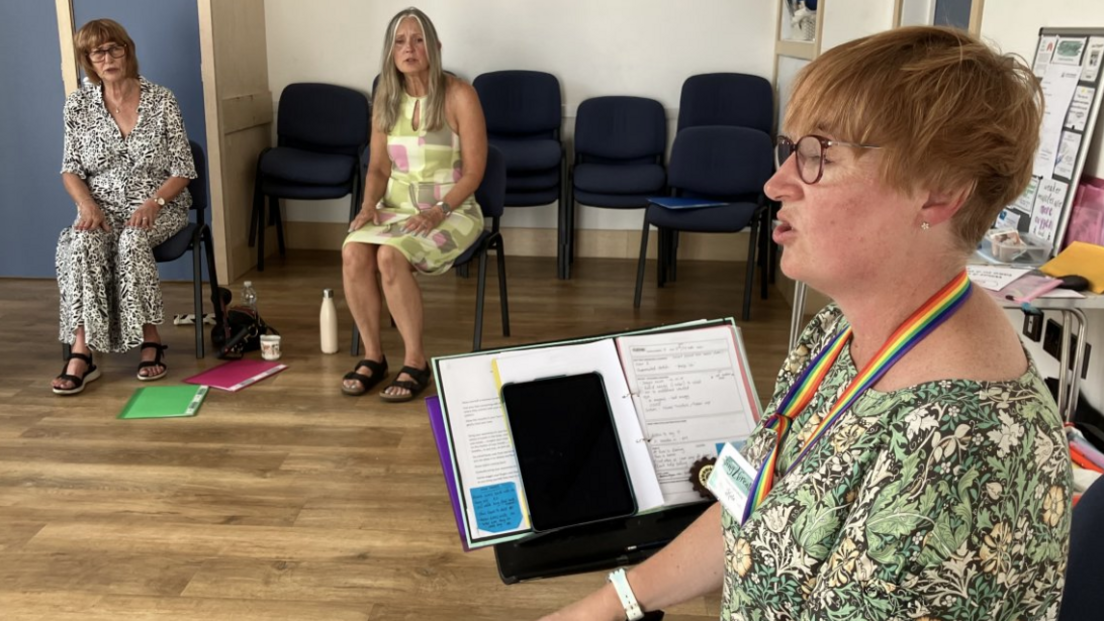Woman calls for end to 'physician associate' use

Ann Birtwistle said she has been left with lung damage after PA missed the signs of a chest infection
- Published
A woman who was left with life-long lung damage after medic missed the signs of a chest infection is calling on the government to take urgent action to protect patients.
Ann Birthistle said a delay in issuing antibiotics for pneumonia at her surgery in Bath, as a result of seeing a physician associate (PAs) instead of a GP, has left her with ongoing difficulty breathing.
Her call comes on the day an independent review of the role of associates has been published which says they should not be involved in triage or diagnosis.
Health Secretary Wes Streeting announced the review last year, following a heated debate over the roles and responsibilities of the healthcare positions.

Singing has helped Ann to breathe more easily
Physician associates were introduced into the NHS in the early 2000s to ease doctors' workloads.
As their numbers grew, concerns were raised about the safety of the roles and the lack of clarity around their responsibilities. They cannot prescribe medication.
Ms Birtwistle now goes every week to a singing for lung health group in Cheddar, North Somerset. She became seriously ill with pneumonia a year ago and now has a incurable lung condition.
The 62-year-old had been coughing for almost six weeks and said she was producing yellow phlegm - which is a red flag symptom for a bacterial lung infection.
But instead of seeing a GP she was assessed by a physician associate.
"She (the associate) was in a doctors office. She had a stethoscope around her neck and she was not supervised by a GP at the time and I asked her what sort of training she'd had because I wanted to probe a little bit and she said she had a couple of years training.
"And I said how many other PAs are there here and she said 'four'.
"She examined me. I told her to read my history because I had had this ongoing problem with the cough and everything and I showed her on my phone the yellow sputum."
Three days later, Ann began to struggle to breathe at home and was rushed to hospital in an ambulance, where she was immediately diagnosed with pneumonia and given antibiotics.
"When the ambulance got there I had a temperature of 39C," she said.
"One of the doctors asked me 'why didn't your GP give you any antibiotics?'
"I said I didn't see a GP I saw physician associate."
While doctors were able to successfully treat the pneumonia, the infection left Ann with an incurable lung condition.
The disease causes a persistent cough, shortness of breath and raises the risk of other life threatening lung infections. Ann believes that had she been seen by qualified doctor, and not a PA, this could have been prevented.
Mrs Birwhistle does not want to identify her practice, but a response to her complaint by the practice said that at the time there were not signs of a serious bacterial infection and they have no option but to employ PAs because they cannot afford doctors to see every patient.
'Rationale unclear'
A review, published on Wednesday, said the associates should be renamed assistants to reduce confusion and reflect the idea they are supporting the medical team.
They should spend at least two years training in hospitals before practicing in GP surgeries or mental health settings.
And it is only once they have had extensive training when they can become "advanced physician assistants and given greater responsibility".
But even then, the review said, they should not deal with patients with vague or overlapping symptoms which don't clearly align with a specific, recognised diagnosis.
Prof Gillian Leng who chaired the review said: "Despite the significantly shorter training, PAs ... have sometimes been used to fill roles designed for doctors.
"The rationale for doing this is unclear, and was probably one of pragmatism and practicality, relying on medical staff to provide the additional expertise when required.
"It seems to assume that much of the doctor's role does not need the skills and qualifications of a doctor, which, if that is the case, requires a thorough reconfiguration of roles and restructuring, not a simplistic replacement of a doctor with an individual who is significantly less qualified."
The doctor's union, the BMA, says the review should have gone further.
See also
'My wife died because the NHS used cheap labour'
- Published13 November 2024
Call for physician associate clarity after death
- Published15 July 2023
Story part 2 goes here
Get in touch
Tell us which stories we should cover in Bristol
Follow BBC Bristol on Facebook, external, X, external and Instagram, external. Send your story ideas to us on email or via WhatsApp on 0800 313 4630.